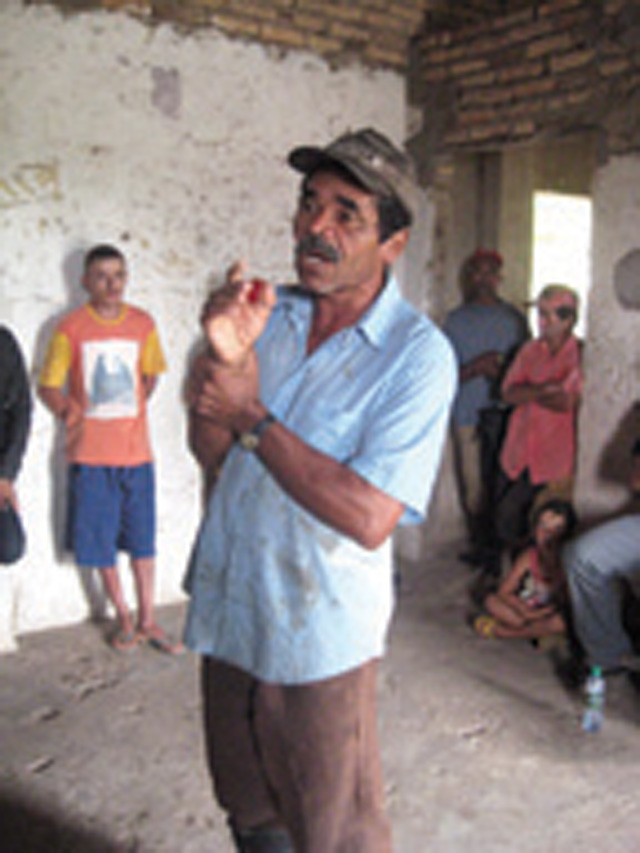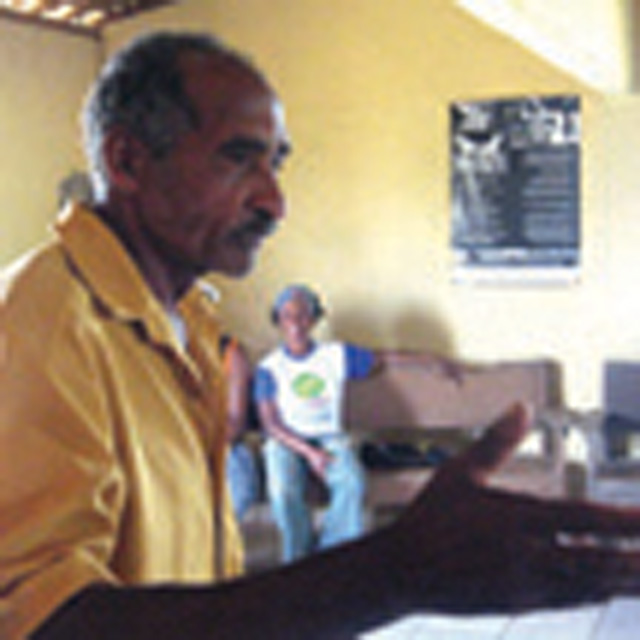An incredible journey
Our Development and Peace solidarity visit was an opportunity to meet people of courage and generosity despite their difficult lives
By Caroline Dow
January/February 2011
Return to Table of Contents
Print Article
Growing up in the 40s and 50s in a Catholic family and taught by nuns in school, we were always reminded of our blessings and we constantly prayed for the poor children in China. So from childhood I had a deep desire to help the poor. Now a grandmother, I had the opportunity to take part in a 15 day Development and Peace solidarity visit to the state of Pernambuco in northeast Brazil. It was an incredible journey.
 João da Silva, a member of the Fazenda Jabuticaba landless community, became emotional while speaking of their efforts to gain land.
João da Silva, a member of the Fazenda Jabuticaba landless community, became emotional while speaking of their efforts to gain land.
Though there is so much to write about, I chose to reflect on our visit to the Agreste, the plateau region, to the landless encampment of Fazenda Jabuticaba where the flag of the MST proudly flies. MST stands for Brazil’s Movement of Landless Rural Workers (Movimento dos Trabalhadores Rurais Sem Terra), one of the oldest and most influential social movements in the world. MST is a long-time partner of Development and Peace.
On a rainy day we set out in our van with our driver Andre, our translator Leo, and two MST staff. Along the uphill drive to the encampment we became stuck in the mud. We thought we would never get to our destination. I prayed hard and thought positively because I felt it was important that we reach this encampment. The people were expecting us. Soon, along came a small four-wheel-drive truck. The driver allowed all of us to pile in, four in the cab and the rest in the back.
Inside the encampment, a large gong hung from a tree. The gong was hit with a big axe to call the community together. It is also used in times of danger. For me, seeing men, women, and children come in from the fields or emerge from their stark, black plastic tents to greet us was a sight that took my breath away and swelled my heart. Tomorrow, we would later learn, the gong would bring this struggling community together for a far less happy reason.
A hundred families live in the encampment, though on the day of our visit many people were at the market selling their produce. We gathered in a dark meeting room where the people stood along the walls or sat on benches, anx-ious to tell their story. We heard of a people who were proud to be self-sufficient, working the land, sending their kids to school, but all against great odds. They have been threatened by thugs with guns and clubs, abused by authorities, evicted 11 times in six years from the land they occupy. In fact, the very next day they were to be evicted once more.
“We want to live by our sweat. We are not stealing. We are working with these tools, with our sweat running. This is why we are here, to work.”
After hearing their stories I was overwhelmed with the simple lunch that they offered to us—a single cob of corn roasted in its husk—quite a contrast to the 12-dish spread that we ate at the previous village we visited. To me it was the most blessed food I would ever eat. We also knew that the people of the other village once lived in a similar tent encampment before acquiring their own land. This gave us hope that, with the help of the MST, surely the people of Fazenda Jabuticaba would one day also own the land.
Before the community came to be supported by the MST, the visits by thugs and the evictions took a greater toll. Evictions were accompanied by the destruction of their tents and crops, and resulted in the children being unable to go to school. When the community returned to their land, the bulldozers had done their work and the planting and building had to be started all over again. Now, the lawyers for the MST negotiate with the judge so that the people’s homes and lands are not touched during these evictions. Three days after our visit we heard that while the eviction did indeed happen, the people were safe, encamped upon the land of the local bishop and set to return to their still-standing homes and crops.
As we prepared to leave the community, my eyes fell on a beautiful woman with the blackest hair, the greenest eyes, the friendliest dimpled smile, and dressed in four shades of pink. She came and took my hand, hugged me and welcomed me into her home. She introduced me to many of her nine children, all as beautiful as she. I will say that never have I had as much respect for anyone as I did for this woman, Maria de Socorro.
I have put a picture of Maria and her family on my mantle alongside our family photos as a reminder of her courage, joy, and generosity despite her difficult journey, and I pray that one day she and her community will have peace. I find it amazing how a single person can touch your heart and never ever know it, as Maria has touched mine.
Caroline has three sons and three grandchildren. Originally from Grand Falls, Newfoundland, she has lived in Rockland, New Brunswick, since 1979. For the past six years she has been a Development & Peace representative at her parish of St. Gertrude’s, with an active team of 14 devoted D&P members, especially her husband Ron.
“I am a person who moves when the light turns green. So now I will speak.” With these words, Hernando of the Chico Mendes settlement (see story Earth, water, seeds, life.) shares his thoughts about the people’s victory and the massive support they received. This new life on land that is legally theirs “is the fruit of our union,” he says. A poet among the people, he offers his comments in verse (as translated to us):
All together with giving hands
We will be a happy people
We only depend on our union to change this country
But we will only change if together we struggle
And plant the seed in the ground
And teach our youth to face the future
The ants are very small
But they do a big action
By the power of their union they receive the blessing of Our Father
Youth, men, women, children
And even our old
Together in one faith for the peace of our nation
I want to see this beautiful country
Again starting to shine
With its people living happily and the child joyfully singing
Return to Table of Contents
Print Article

